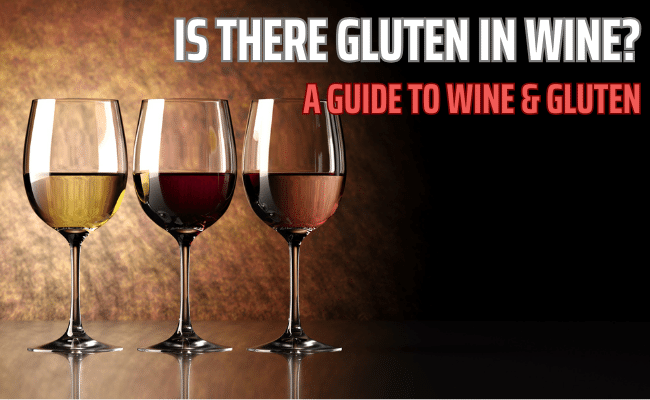Is Wine Gluten Free? How Does Gluten Get Into Wine?

To be able to claim a food or drink product in the USA as being 'gluten-free', the FDA have a limit on the amount of gluten they may contain.
The limit is 20 parts per million (ppm) or around 0.002% gluten.
This limit was chosen because it is the lowest amount that can be reliably detected.
Therefore, a wine (or any other food or drink) can still be labeled 'gluten free' even if it still has trace gluten amounts present.
The vast majority of wines meet this requirement for gluten and can be labeled 'gluten-free'.
Dessert wines are the ones you need to be careful with and check before you drink.
What is Gluten?
This is a general name for proteins found in grains such as wheat, barley, and rye to name just a few.
This means gluten is present in all foods that are made from or contain traces of the cereals mentioned above.
And as odd as it may seem, it is not rare to find gluten in foods that you hardly expect to contain it.
Problems with Gluten
Grains such as oats, rye, wheat, and barley are used to make many alcoholic beverages.
If you are sensitive to gluten, these are indeed not a safe choice of a drink. Celiac disease makes the intestines too sensitive to gluten found in grains and wheat, resulting in a myriad of symptoms, including migraines, fatigue, and digestive issues, among others.
The celiac disease is a severe autoimmune condition which is potentially life-threatening, and even minimal exposure to gluten can have devastating effects on these individuals, causing irreversible intestinal damage.
On the other hand, non-celiac gluten sensitive people get allergic reactions from gluten exposure.
Even though mild in nature, they should still determine you to go for a wine that contains no gluten or has minimal traces of it.
Does Wine Really Contain Gluten?
Wine is made from grapes and since they do not have gluten is thus considered gluten free.
However, traces of gluten might find their way in it during the winemaking.
It all depends on the processes the winemaker uses.
For it to be considered gluten free, the limit is 20 parts per million (ppm) or around 0.002% gluten.
So, how exactly can small amounts gluten get into that bottle of wine made only from grapes?
How Can Gluten Find its Way into Wine?
Wine consumers that are particularly sensitive to gluten might get a surprise reaction to wines made only with grapes.
This does not mean, however, there are any additives in the wine they take. Nevertheless, there are a couple of ways gluten might end up in wine when it is being made.
Here’s a look at some of them:
How to Get Gluten Free Wine
Although the quantity is negligible, some people might react to the little gluten wine contains. This doesn’t mean, however, you should stop drinking wine.
Since wine is made of grapes, it doesn’t naturally contain gluten. Which means you just have to source all natural wine from one of your favorite wineries. Here’s how to do it.
Other Ways of Getting Gluten Free Wine
The only way for wine to have gluten in it is through agents used for sealing and fining.
One sure way for you to be sure the wine you drink does not contain gluten is to go for a young wine that has not been through the aging process.
If you don’t really have a preference for one type of wine, it’s an excellent idea to give whites a try.
These wines rarely go through the aging process, so they are not exposed to any wheat paste sealant.
However, remember you still have to check what fining agents have been used for making your wine. And remember that most wineries don’t specify this particular on the label.
Gluten or Gluten-Free?
The question begs answers especially for people who are keen to avoid gluten in their diet. Luckily, more and more winemakers give up to fining agents and wooden wine casks to prevent producing a wine that contains traces of the protein.
Since in its natural form wine doesn’t contain gluten, a safe way to source gluten-free wine is by buying from a winery that promotes standardized winemaking processes and uses selected fining agents which guarantee the lack of gluten in the end product.
It is also worthy to note that even when wine does come in contact with gluten, the traces contained in a bottle are almost always negligible.
As far as the standards of the amount of gluten that is permissible for consumption are concerned, you find that wine is mainly gluten free as it might only contain minimal amounts of gluten, if at all. This then erases the fear among people that are careful not to consume gluten for health reasons.
Therefore, going by the fact that most wine does not produce any symptoms among people with either celiac disease or with non-celiac gluten sensitivity, it is safe to regard wine as gluten-free. That’s because only a small percentage of consumers actually get symptoms after drinking wine.
Considering many wine producers no longer age wine in wooden casks eliminating the use of wheat paste as a sealant, the chance of getting gluten into wine are even fewer.
These facts lead back to the question of whether the wine is gluten-free or not. Going by the facts above it is safe to assume there is no harmful gluten found in wine, after all.
